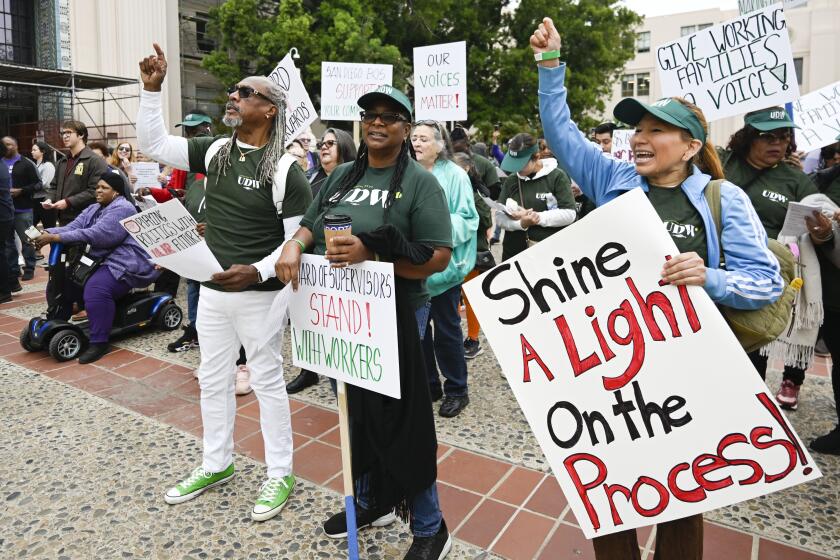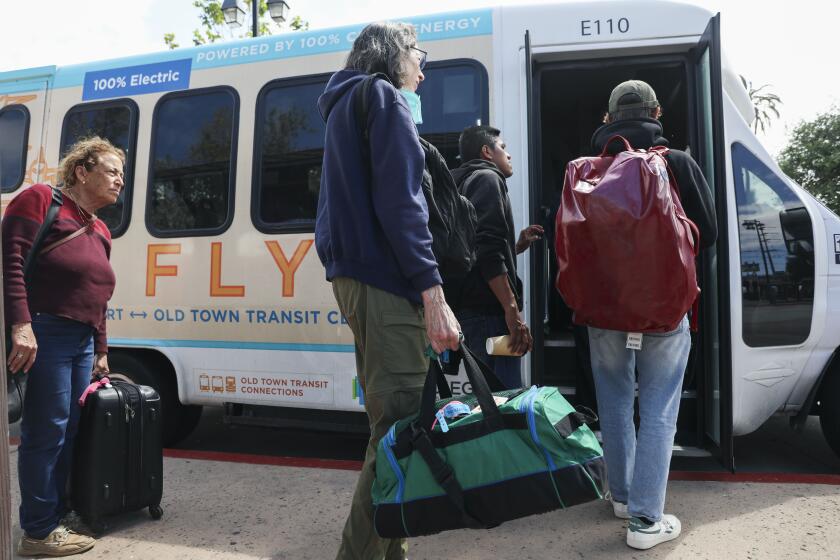Column: ‘Parents’ rights’ becomes a driving force for GOP politics

Virginia Gov.-elect Youngkin found success in focusing on parents’ concerns about education and interactions with school boards, but racial issues permeated the approach
Sales for “Beloved,” the Pulitzer Prize-winning novel by the late Toni Morrison, took off last month.
Even though the book was published in 1987, that shouldn’t be a surprise.
The contention that the novel should not be part of the curriculum in Virginia schools became shorthand for the concept of “parents’ rights” that helped fuel Republican Glenn Youngkin’s successful campaign for governor in the Democratic state — along with his call to ban the teaching of critical race theory.
The attention apparently convinced a lot of people to buy “Beloved,” which is considered a major work of American literature. The novel may not be central to other Republican campaigns in the coming election year, but it seems likely the kind of broader appeal Youngkin made to parents will be.
Republicans have been trying to figure out how to regain ground lost to Democrats in suburbs across the nation and think they’re on to something.
On Tuesday night, Rep. Darrell Issa, R-Bonsall, took to Twitter to declare Youngkin’s election “a historic victory for Virginia’s children and parents.”
The veteran member of Congress is largely known for his positions on national and international concerns, along with sharp criticism of Democratic presidents. But he also has focused considerable attention this term on matters within his East County-based 50th Congressional District, including making appearances at schools.
Last month, he introduced a resolution supporting parents who are “collectively and constructively voicing deeply held and valid concerns about divisive educational decisions with which they strongly disagree. . .”
After Tuesday’s election, House Minority Leader Kevin McCarthy, R-Bakersfield, said Republicans will introduce a “Parents’ Bill of Rights.”
Lessons can be learned from every election, but wise political people stress caution in automatically concluding that what worked in one will work in others. While elections often have similar overarching issues, each campaign involves different candidates and dynamics, often localized, that don’t translate to other campaigns.
In Virginia, Youngkin, a businessman, kept his distance from former President Donald Trump while not alienating Trump supporters. He presented an approachable image, did not come off as a partisan warrior and talked about “kitchen table issues” like lower taxes, public safety, education and jobs.
He also pressed some cultural issues to the detriment of his Democratic opponent, Terry McAuliffe, the former Virginia governor.
That’s were “Beloved” came in. The acclaimed novel delves into the horrors of slavery with unflinching depictions of rape and other violence.
Late in the campaign, Younkin released an ad featuring Laura Murphy, a mother who sought to ban “Beloved” from her son’s high school. She had lobbied state lawmakers to pass a bill allowing parents to opt their children out of reading sexually explicit content in schools. As governor, McAuliffe vetoed two such bills.
Murphy didn’t specifically mention “Beloved” in the ad, but it was clear that’s what she was talking about.
The controversy over the book was unique to this campaign; so was McAuliffe’s major-league blunder during a debate. “I don’t think parents should be telling schools what they should teach,” he said.
Youngkin also began referring to two alleged sexual assaults in Northern Virginia schools by one student. Critics said he was irresponsible in using those incidents to instill fear in parents and raise concerns about student safety statewide.
On the other hand, critical race theory has become a political flashpoint in education across the country, including in some school districts in San Diego County. The main theme is that racism is not just perpetuated by individual biases, but that it has been embedded in the legal system and governmental policies.
It’s not clear how much the theory is taught in K-12 schools in Virginia or anywhere, if at all. Sometimes, critical race theory gets conflated by opponents with ethnic studies and even diversity training in education.
National political commentator Juan Williams recently asserted that “parents’ rights” is a campaign “to stop classroom discussion of Black Lives Matter protests or slavery because it could upset some children, especially White children who might feel guilt.”
But Williams, who is Black, said the movement on its face does not appear to have anything to do with race.
“That puts Democrats on the defensive. They are in the uncomfortable position of calling the attention of suburban White moms to divisive racial politics being used by Republican Glenn Youngkin’s campaign,” he added.
Prescient or not, his column in The Hill was published the day before the election, where a NBC exit poll showed White women supported Youngkin 57 percent versus 43 percent for McAuliffe. By contrast, the White female vote in Virginia in 2020 was essentially split between Democrat Joe Biden and Trump, according to NBC.
However, part of the “parents’ rights” push came out of disputes over school mask and vaccine mandates, and school closures during the coronavirus pandemic. Those aren’t particularly linked to racial issues or neatly divided along partisan lines.
The Issa resolution followed a letter to Biden from the National School Boards Association asking for federal law enforcement assistance because of increasing threats against public school officials.
“As these acts of malice, violence, and threats against public school officials have increased, the classification of these heinous actions could be the equivalent to a form of domestic terrorism and hate crimes,” the letter said.
Conservative activists and commentators falsely claimed the school board organization was accusing parents of being terrorists.
The Issa resolution “condemns any and all designations from educational professionals or any level of government to label active, involved, and concerned parents as ‘domestic terrorists.’”
The word “parent” is not included in the association’s letter. The group nevertheless apologized following the uproar. Further, there’s no indication that Biden or the Department of Justice has labeled protesting parents domestic terrorists, according to the Associated Press.
Issa’s office did not respond to two emails seeking examples of educational professionals, government officials or agencies who labeled parents with that term.
What the resolution doesn’t include is any context about the well-documented reports of harassment, intimidation and threats of violence against school board members.
How Democrats respond to this GOP strategy could be key to their fortunes. Simply going to the anti-Trump well once more, as McAuliffe did, isn’t the answer.
The 2022 elections may be determined, at least in part, by who wins the hearts and minds of parents.
Get Essential San Diego, weekday mornings
Get top headlines from the Union-Tribune in your inbox weekday mornings, including top news, local, sports, business, entertainment and opinion.
You may occasionally receive promotional content from the San Diego Union-Tribune.












